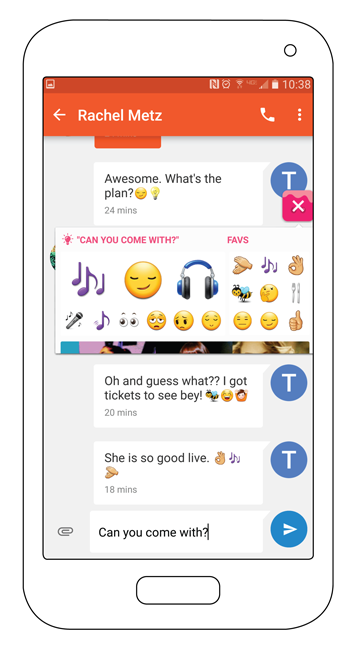This App Knows Just the Right Emoji for Any Occasion

Emoji add pictorial sparkle to typed conversations; an image of a tiny slice of pizza or a cheeseburger, for instance, makes a simple question like “What’s for dinner?” a little more fun to ask. Hunting for the right one to express a more complex thought, though, can leave you feeling a bit like the Face with Open Mouth and Cold Sweat character.
Dango, a new Android app from the Toronto-based startup Whirlscape, aims to make it easier to sift through the ever-growing array of choices. There are well over 1,000 characters, plus many variations, according to the group that manages emoji, the Unicode Consortium. This month alone, 72 have been added.
The Dango app is named for a Japanese dessert consisting of sweet dumpling balls on a skewer (and yes, there’s an emoji for it). It sits atop other communication apps like Slack, Snapchat, or the built-in texting app on your phone. It suggests emoji that it thinks fit well with what you’re typing or in response to what someone just typed to you. You tap on the suggestion to add to the conversation.
Rather than simply coming up with word associations (such as a chicken emoji if you type “chicken”), Dango uses deep-learning techniques to try to figure out what whole sentences are expressing and then give you suggestions it thinks are related. For instance, if you type “She said yes!” Dango will show you the emoji for a ring and a bride with veil, among others.
Xavier Snelgrove, Whirlscape’s cofounder and chief technology officer, says Dango has been trained by scanning posts on Instagram, Reddit, and Twitter. The app only works on Android phones for now, since Apple doesn’t allow software developers to build such a tool, Snelgrove says; if it were on the iPhone, it would have to be part of a keyboard app. Separately, Whirlscape does sell a keyboard app called Minuum that includes emoji prediction, but it’s doing simple word association.
Keep Reading
Most Popular
Large language models can do jaw-dropping things. But nobody knows exactly why.
And that's a problem. Figuring it out is one of the biggest scientific puzzles of our time and a crucial step towards controlling more powerful future models.
The problem with plug-in hybrids? Their drivers.
Plug-in hybrids are often sold as a transition to EVs, but new data from Europe shows we’re still underestimating the emissions they produce.
Google DeepMind’s new generative model makes Super Mario–like games from scratch
Genie learns how to control games by watching hours and hours of video. It could help train next-gen robots too.
How scientists traced a mysterious covid case back to six toilets
When wastewater surveillance turns into a hunt for a single infected individual, the ethics get tricky.
Stay connected
Get the latest updates from
MIT Technology Review
Discover special offers, top stories, upcoming events, and more.